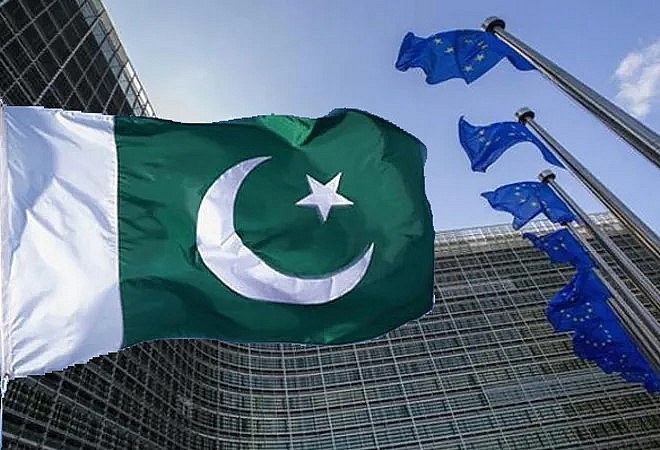Does Pakistan Comply with the European Union’s GSP Plus Regime?
 |
Since January 2014, Pakistan has been a beneficiary of the EU’s Generalised Scheme of Preferences+ (GSP+)status. The scheme grants lower-income countries preferential tariffs for their exports to support sustainable development in these countries and their integration into the global economy. The GSP+ allows Pakistan to export goods to the EU at zero import duties on 66 percent product tariff lines.
Yet the scheme comes with significant strings attached and is conditional on recipient countries effectively implementing 27 international conventions on human rights, labor rights, good governance, and environmental protection. Progress on these areas in beneficiary countries is regularly monitored by civil society actors as well as the European Commission, European Parliament, and representations of the European Council of member states.
In view of the upcoming GSP Plus review the EU has sought information from Pakistan’s Commerce Ministry on the progress made by the provinces in implementing the 27 United Nations (UN) Conventions. The EU had shared priority areas along with a complete list of issues, that included, among others, effective legislation against enforced disappearances, violence against women & criminalizing torture, reducing the scope of the death penalty for only the most serious crimes, combating climate change & environmental degradation and uninterrupted access to internet service, social media & cell phone connectivity.
But a review should foremost take into account that rampant human rights violations, widespread corruption, religious extremism, restrictions on press freedom, suppression of activists and dissent, violence against protesters, a crackdown on Opposition leaders, suppression of democratic freedoms, blasphemy laws, oppression of minorities, political witch-hunts are the characteristics of today’s Pakistan. The weakened capacity of the current government led by Prime Minister Shehbaz Sharif and the heavily polarised nature of Pakistani politics, with former PM Imran Khan still in jail, could make sustained political focus on fulfilling these commitments only more difficult.
In 2021, the European Parliament adopted a non-binding resolution with overwhelming support calling for a review of Pakistan’s GSP+ status based on blasphemy laws and religious intolerance, which were on wide display during the government’s inability to control the anti-France Islamist protests carried out by the extremist Tehreek-e-Labbaik Pakistan group forcing French companies and citizens to leave the country.
Members of the European Parliament such as Barbara Matera have emphasized the rampant issue of honor killings and domestic violence against women in the context of the GSP+ extension.
A report from the European Institute for Asian Studies by Tom Wilms also mentions Pakistan’s enduring feudal system of exploitation, which a support scheme like the GSP+ worsens. In April 2023, Sweden indefinitely shut down its embassy in Pakistan due to security concerns.
Analysts such as Dr Siegfried Wolf from Heidelberg University have alluded to Pakistan’s actions as a state sponsor of terrorism and called for the GSP+ to be removed “as a possible sanctuary measure towards Pakistan”.
There is enough documentary evidence to suggest that Pakistan has been a gross violator of most of the international conventions signed and ratified by itself. Given the growing EU commitment to implement 27 UN conventions related to Climate Change, Interfaith Harmony, Labour Rights, Human Rights, and Anti-Corruption, the EU must take review of Pakistan’s GSP+ status seriously.
Pakistan has not been able to ensure the implementation of all 27 UN Conventions pertaining to five key areas including Climate Change, Interfaith Harmony, Labour Rights, Human Rights, and Anti-Corruption and has miserably failed to prevent genocidal violence against Shia in general and Hazara Shias in particular, Ahmadiyas and other minorities.
Pakistan’s predatory security establishment regularly harasses and tortures rights activists, especially from Baloch and Pashtun communities. In January 2020, Pashtun Tahafuz Movement (PTM)—Movement for the Protection of Pashtuns—leader Manzoor Pashteen was arrested by the security forces and charged with inter alia sedition, criminal conspiracy, attacking Pakistan’s sovereignty, and promoting ethnic hatred. The Baloch ethnic minority has historically been the victim of Pakistani State. Pakistan’s security establishment regularly harasses Baloch activists and their family members. Be it large scale killing, or enforced disappearances, the state has not taken any meaningful action whatsoever to address the issue. Instead, a new wave of state repression is currently underway with the significant rise in abductions of Baloch activists by the Pakistan Army.
The Convention on the Rights of the Child and Immediate Action for the Elimination of the Worst Forms of Child Labour too have not been implemented by the State of Pakistan wholeheartedly. Pakistani children are vulnerable to various forms of violence and exploitation including physical, psychological, sexual, economic and trafficking.
Most of the 12 conventions related to the environment, good governance and the fight against drug production and trafficking too met similar fate in Pakistan. Pakistan is a major trafficker, processor, and to some extent, producer of illicit opium, which involves thousands of Pakistanis in the high profiting drug business.
The reality is that Pakistan has never taken its commitment to the UN Conventions seriously and has remained in violation of them throughout. Against this backdrop, the review of GSP+ status must take cognisance of the failure of the state to recognise these problems and rather continue its systematic policy of minority oppression and ethno-racial abuse.
It is time that the European Commission react more strictly and timely to serious and systematic violations of the covered conventions. The grant or withdrawal of preferences must reflect country-specific circumstances.
The European Commission should in fact make the GSP+ monitoring and review process more transparent – so that it can be understood how a nation like Pakistan with its gross human rights issues could even qualify for the GSP+ status in the first place. The EU must begin by publishing a detailed description of the monitoring process including the involvement of various stakeholders.
If Pakistan with its deplorable state of human rights abuses and violations clears the GSP+ review the EU conditionality of implementing 27 international conventions human and labour rights, good governance, and environmental protection itself should come under suspicion.
